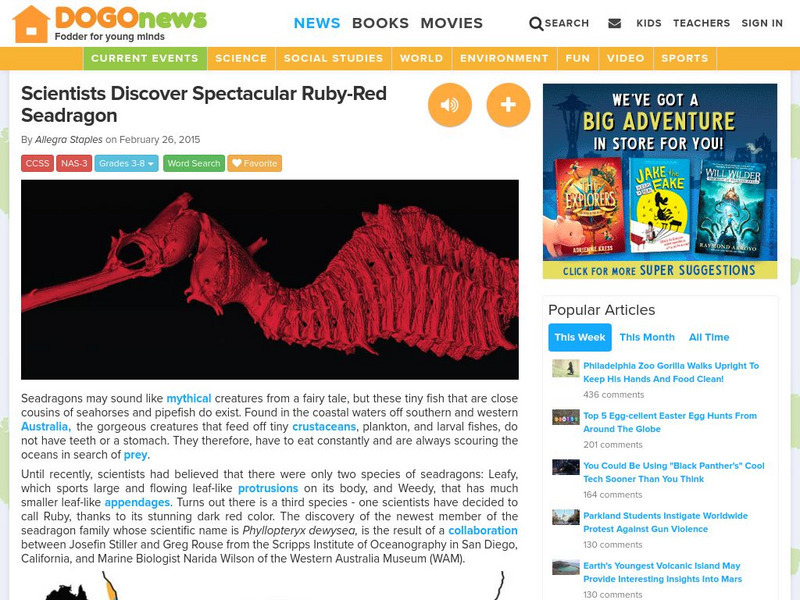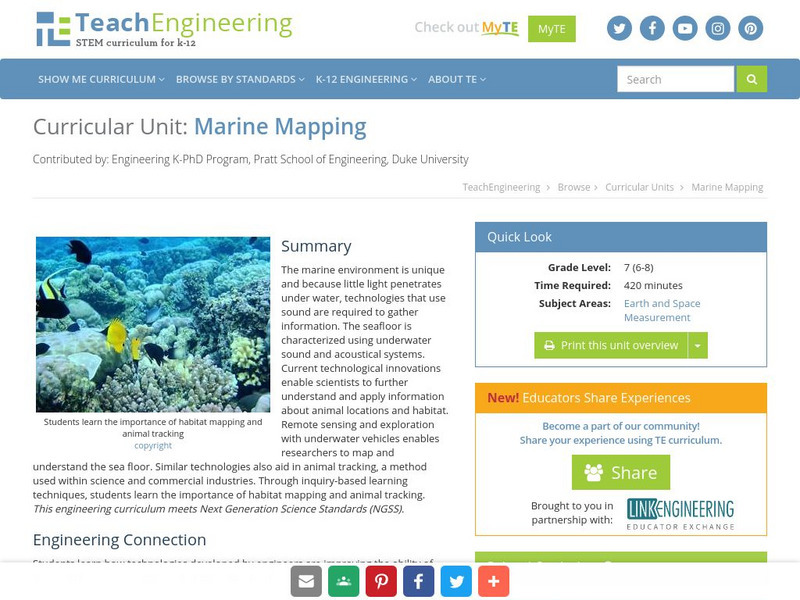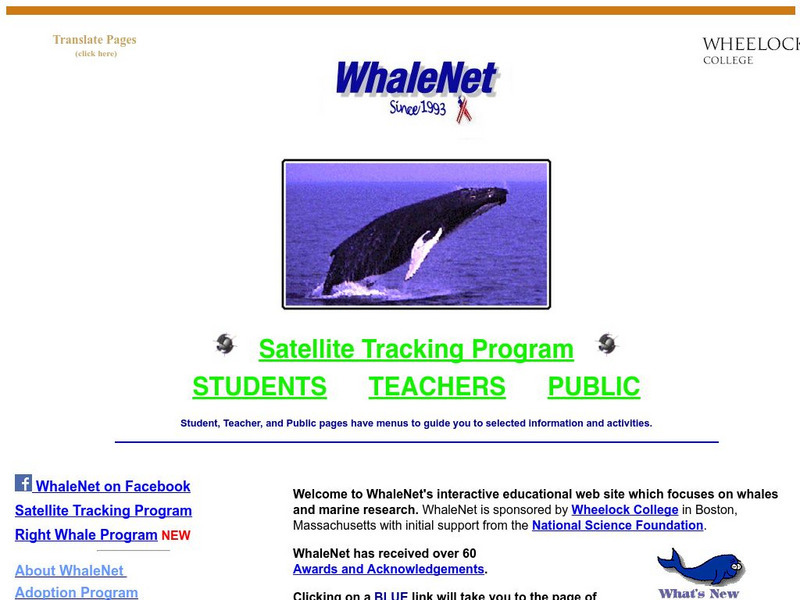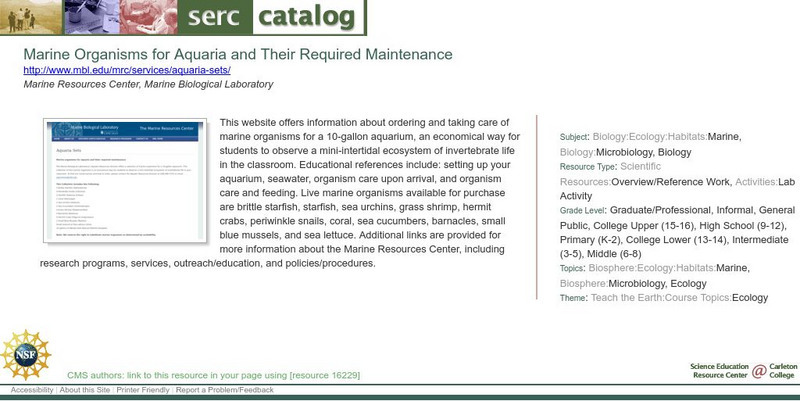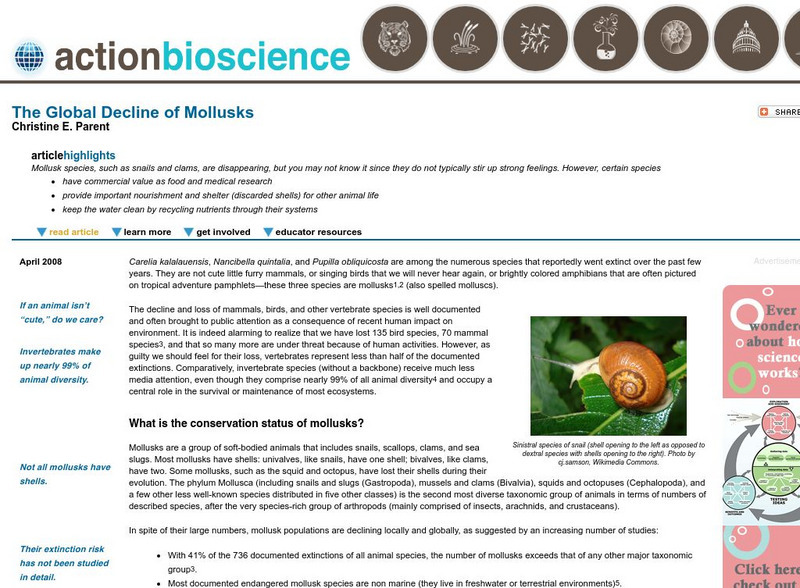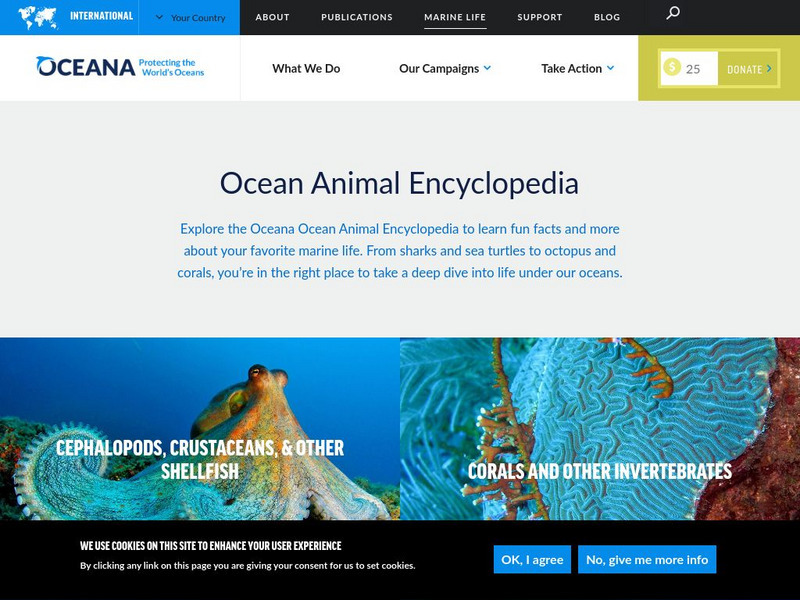SEDL
Oceans [Pdf]
This large PDF file integrates math, science, and language into several lessons about characteristics of the oceans. Topics include ocean currents, tides, density, marine life, and pollution.
DOGO Media
Dogo News: Scientists Discover Spectacular Ruby Red Seadragon
Read about the discovery of a seadragon. Includes video.
Georgia Department of Education
Ga Virtual Learning: Marine Vertebrates
Learn about vertebrates found in the ocean, their individual methods of adaptations, identifying characteristics and contributions to the marine ecosystem.
TeachEngineering
Teach Engineering: Marine Mapping
The marine environment is unique and requires technologies that can use sound to gather information since there is little light underwater. The seafloor is characterized using underwater sound and acoustical systems. Current...
Smithsonian Institution
Smithsonian National Zoo
Here is the National Zoological Park right at our fingertips. Students will find many things to explore at this colorful and engaging site. Any study of animals will have a successful start here. Chances are students can catch their...
NOAA
Noaa: Living Ocean Gallery Invertebrates
Many still photographs and video clips of marine invertebrates are available in this huge collection.
Unite for Literacy
Unite for Literacy: Animals: Who Is in the Ocean?
A riddle book about ocean animals. Includes audio narration in 17 additional languages with text in English.
Unite for Literacy
Unite for Literacy: Animals: Ocean Beasties
See some of the amazing animals that live in the ocean. Each page has one animal name and a photograph. Includes audio narration in English and Turkish with text in English.
Other
Wheelock College: Welcome to Whale Net
Students and teachers will love investigating this whale of a resource! Lesson plans, activities, and some impressive stories of satellite tagging make this award-winning site. Find out about Erden Eruc, a man from Seattle who has given...
American Museum of Natural History
American Museum of Natural History: Milstein Hall of Ocean Life
Tour the museum's famed exhibition hall dedicated to ocean life at this online recreation. Find videos, maps, species specimens, and images that let you experience many of the museum's resources on ocean life right from your desktop.
American Museum of Natural History
American Museum of Natural History: Find My Plankton Baby Picture
By observing photos of plankton at different life stages, students can obtain information that will allow them to construct evidence-based accounts of how parents and offspring don't always look alike.
PBS
Pbs Learning Media: Breathing
Breathing shows an underwater scene and asks the students to answer the question, How do the people, fish and turtle get the oxygen they need?
Sea World Parks & Entertainment
Sea World: Marine Mammal Training
Learn how SeaWorld trains its marine animals.
University of Arizona
Feeding Habits of Marine Animals
Marine Discover at the University of Arizona posts this lesson plan and activities which integrates the feeding habits of different marine wildlife. Step by step activity along with assessment and extentions are included.
Science Education Resource Center at Carleton College
Serc: Marine Organisms for Aquaria and Their Required Maintenance
What can you do with an ocean animal aquarium in your classroom? This website offers information about ordering, setting up, and taking care of marine organisms for a 10-gallon aquarium which is a great way for students to observe a...
Wikimedia
Wikipedia: Echinoderm
Wikipedia provides detailed information on echinoderms, or a phylum of marine animals including star fish and sea urchins. Website includes image, chart of scientific classification, and many hyperlinked terms.
American Institute of Biological Sciences
Action Bioscience: The Global Decline of Mollusks
You can help! Species of mollusks are disappearing from our marine sources. While it might not be obvious to the casual beach-goer, these shelled creatures provide food and shelter, medical research, and help keep our waters clean.
TED Talks
Ted: Ted Ed: How Giant Sea Creatures Eat Tiny Sea Creatures
Kelly Benoit-Bird discusses new research that shows large sea animals actually herding their tiny food into big, bitable chunks. [6:22]
TED Talks
Ted: Ted Ed: Underwater Astonishments
David Gallo shows jaw-dropping footage of amazing sea creatures, including a color-shifting cuttlefish, a perfectly camouflaged octopus, and a Times Square's worth of neon light displays from fish who live in the blackest depths of the...
PBS
Pbs Kids: Wild Kratts: Capture the Fishmobiles
Utilize Creature Powers to capture as many fish as you can while riding around in the ocean in miniature fish-themed vehicles called Fishmobiles. Can you keep up with the rapid, precise movements of schooling fish?
PBS
Pbs: Secrets of the Ocean Realm
At this site students can read about sea creatures and ocean plant life, and see pictures of each.
Other
Oceana: Marine Animal Encyclopedia
Learn about marine animals with this marien animal encyclopedia. Animals are arranged by species.
San Diego State University
San Diego State University: Researching Research
This comprehensive unit site from the San Diego State University is geared towards seventh grade math and science students. "Students will chose a research project currently in progress and research it using traditional techniques, the...
Read Works
Read Works: Dead Zone
[Free Registration/Login Required] Students read about the "dead zone," an area in the Guld of Mexico where no fish can live due to pollution from fertilizer. A question sheet is available to help students build skills in cause and effect.


![Oceans [Pdf] Activity Oceans [Pdf] Activity](https://d15y2dacu3jp90.cloudfront.net/images/attachment_defaults/resource/large/FPO-knovation.png)
